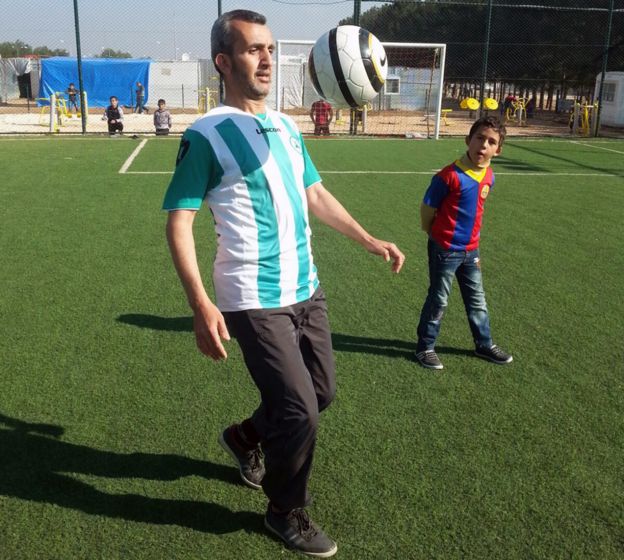
'There were other executions and disappearances all over the country too. Raed's father, a politician who supported the wrong side when the ruling Baath party split, was taken away by the secret police and never seen again. Raed was then just 10 years old.
"I was always afraid, afraid of everything, because our regime is very harsh," he says. "To this day I don't know where my father is, whether he's alive or not… It's better not to try to imagine, because it's so awful what happens in our prisons - it's better to think he died a long, long time ago."
The regime was bombing Marea relentlessly, and the walls of the soccer complex were soon pitted with shrapnel. Raed returned to Russia, and Muhammad al-Farouh, the tall striker everyone had admired for his running and singing abilities, decided it was too dangerous for his family to stay in their home town. Abdul-Rahim, the impetuous one with the wild hair, is now a fighter with the Free Syrian Army.
Yasser, who created the team, thinks there are some lines that can't be crossed. He always hated the government, even as a boy, and he says he'll never speak again to another player, Abdulrazzak, who now works for Assad's political intelligence service.
"I could say hello to someone else from the government side, but not someone from my own town, a cousin of mine, who knows exactly what happened - that in the beginning there were peaceful demonstrations, but they started killing us. That I cannot forgive him for."
Yasser, who created the team, thinks there are some lines that can't be crossed. He always hated the government, even as a boy, and he says he'll never speak again to another player, Abdulrazzak, who now works for Assad's political intelligence service.
"I could say hello to someone else from the government side, but not someone from my own town, a cousin of mine, who knows exactly what happened - that in the beginning there were peaceful demonstrations, but they started killing us. That I cannot forgive him for."
Meanwhile Muhammad al-Farouh, the star runner who spent time as a major in the Syrian air force, still plays football every Friday in his refugee camp. He runs the camp nursery school, with 800 kids. But he can't always handle the questions they ask.
"One child asked me why Bashar is the president of Syria when he bombs Syria, and other presidents don't bomb their countries," Muhammad says.'
"One child asked me why Bashar is the president of Syria when he bombs Syria, and other presidents don't bomb their countries," Muhammad says.'

